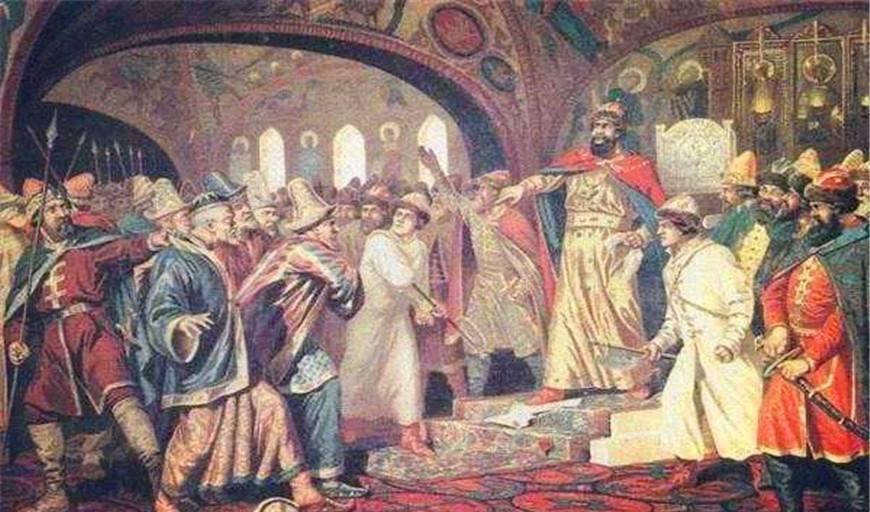Without the rise of the Mongol Empire, there would be no Russia today. So much so that Europeans say that stripping every Russian body, you can see a Tatar in it, which is why Europeans don't recognize the Russian Empire.
It has to be said that Russia was also the successor state of Mongolia, and in 1237 AD, the Mongol army invaded Europe, and the Russians at that time became part of the Golden Horde at that time, which began the five-hundred-year "Tatar" era. "Tatar" is a Russian word that refers to the Turkic-speaking Muslim Mongols. In fact, it is more appropriate to call Russia at that time Ross. Under Mongol rule, the Rus' for the first time had a system of taxation and household registration, with their own administrative bodies. The Rus' began to be keen on marrying the Mongols. The Rus accepted Mongol rule for five hundred years and was almost completely Mongolized, which was the basis of Russian civilization. Only in religion did the Rus' believe in their own Orthodoxy.
In the early 14th century, Ivan I, Duke of Moscow, received the patronage of the Golden Horde, the Month of the Behan, and was crowned Grand Duke in 1328, while Lithuania was the great power vying for moscow and Rus' hegemony. The king of Lithuania married the Queen of Poland, became a Christian, and served as king of Poland. Rus' under Lithuanian rule at that time was now Belarusian, while Rus', under Polish rule, was now Ukrainian.
Hajiglai, the crown prince of the Jurchen family, with the support of Lithuania and Poland, became the Great Khan of the Crimean Khanate. Four years later, The son of Hajiglai Khan, Mingliglai, became the lord of the Golden Horde and merged with Crimea. Russian historians refer to what happened in 1502 AD as the "fall of the Golden Horde." Ivan III, Grand Duke of Moscow at the time, began to merge the territories of the Dukes of Rus' and unify them.
Nevertheless, Ivan IV added the title of "Tsar of Kazan and Astrakhan" in addition to the title of "Grand Duke of All Rus'" (All Rus'). The Russian word for "tsar" comes from the Latin word "caesar", referring not to the "emperor" of the Roman Empire, but to the Mongolian word for "khan". On the other hand, the mighty Crimean Golden Horde attacked Moscow in 1517 and demanded tribute from Moscow. Moscow continued to pay tribute to Crimea until the end of the 17th century.
In 1575, Ivan IV placed Simeon Bekbulatovich (Mongolian named Sainblatt) on the kremlin throne, proclaiming him Tsar of All Rus' (Khan)." Ivan IV adopted the form of accepting the Zen concessions of the Mongol Crown Prince, giving himself the legitimacy of sitting in the position of Tsar of Moscow. In this way, the Grand Duke of Moscow became the Great Khan of all Rus' for the first time, on an equal footing with the other Great Khans of the Mongol Empire. This is the origin of the Russian Empire.
Shortly after ivan IV's death, the Mongol nobleman Boris Godunov became tsar. Tsar Boris Godunov died in 1605 AD, and in 1613 Mikhail Romanov was elected Tsar, establishing the Romanov dynasty. He was the first Tsar neither a Rus', nor a Mongol of the Jurikh family. From here, it can be said that the era of real Russia has entered. In 1721, the title "imperator" was adopted.
The Golden Horde collapsed in 1783 and Catherine II annexed Crimea. It took 546 years from 1237 when Battu led a Mongol army to invade Rus' and continued until the fall of the Golden Horde. In 1945, Stalin destroyed the Autonomous Republic of Crimea and exiled the local Tatars, who were descendants of the Mongols of the Golden Horde.
Thus, Russia was at best the successor state of the Mongol Empire, and until peter I in the 18th century, Russia was part of Mongol civilization. From the beginning of the Westernization of Peter I, it is truly entering the century of its own.
